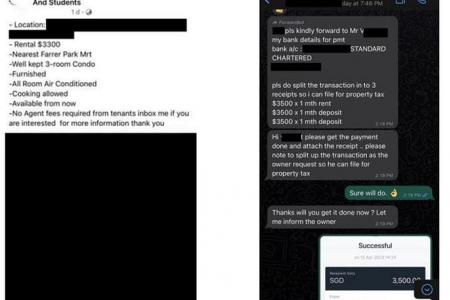Over $2.4m lost to realtor impersonation scam in 6 months
A scam involving the impersonation of property agents has led to at least 389 victims losing at least $2.4 million between July 2023 and January 2024.
The scammers are impersonating Council for Estate Agencies (CEA) registered agents.
The police said on Feb 2 that victims were pressured by fake property agents into making payments to secure the viewing or rental of properties.
Victims would typically respond to property rental listings on various online platforms or websites, such as Facebook, Carousell, and rental advertisement sites.
The largest number of victims responded to listings on Facebook, the police added.
The scammers would impersonate legitimate property agents on WhatsApp, using the contact numbers published in the property listing, and convince their targets of their credentials by sending pictures of property agent passes, business cards and pictures/videos or virtual tours of the rental property.
However, the contact numbers provided would differ from the actual contact numbers of the actual property agent registered with CEA.
When victims asked to view the property, the scammers would claim that there was high demand to rent the property and try to convince the victims into making deposits to secure a viewing of the property.
Those targeted would discover that they had been duped when the scammers were no longer contactable or when they reached out to the actual property agents who had been impersonated.
In some cases, victims were asked to meet the “personal assistants” of the fake property agents who would help facilitate their viewing of the property, and were told to provide their personal particulars for the tenancy agreement and to make payments for the rentals through bank transfers or PayNow.
However, the scammer or “personal assistants” would be uncontactable after receiving payments.
Between July 2023 and January 2024, at least 144 victims fell prey to this particular scam variant involving “assistants”, with total losses amounting to at least $917,000, the police said.
The police advised the public not to rely on Facebook or Carousell listings, or any details given by potential scammers.
Potential tenants should verify the identity of the property agents renting out the properties against the CEA Public Register before any deals by checking if the phone number in the listings belongs to a CEA-registered agent.
Members of the public should key in the advertised phone number on the CEA Public Register. If the search does not lead to a CEA-registered property agent’s profile page, it means that the phone number is not registered with CEA and is likely a scam, even if the property agent’s name and registration number can be found in the register.
Potential tenants should also view the properties in person and check that they are dealing with the actual CEA-registered property agent themselves, and not their assistant, the police said.
According to CEA practice guidelines, all property agents should meet potential tenants and occupiers face to face to verify their identity for all residential rental transactions.
The police added that all property agents are not permitted to demand and collect payments to view or rent properties.
Payment of rental deposits or rent should be made directly to the landlord using verifiable payment modes such as crossed cheques and bank transfers, and must be paid to the landlord’s bank accounts.
Anyone with information relating to such crimes should call the police hotline on 1800-255-0000, or submit it online at police.gov.sg/iwitness
For more information on scams, visit scamalert.sg or call the Anti-Scam Helpline on 1800-722-6688.
Get The New Paper on your phone with the free TNP app. Download from the Apple App Store or Google Play Store now


